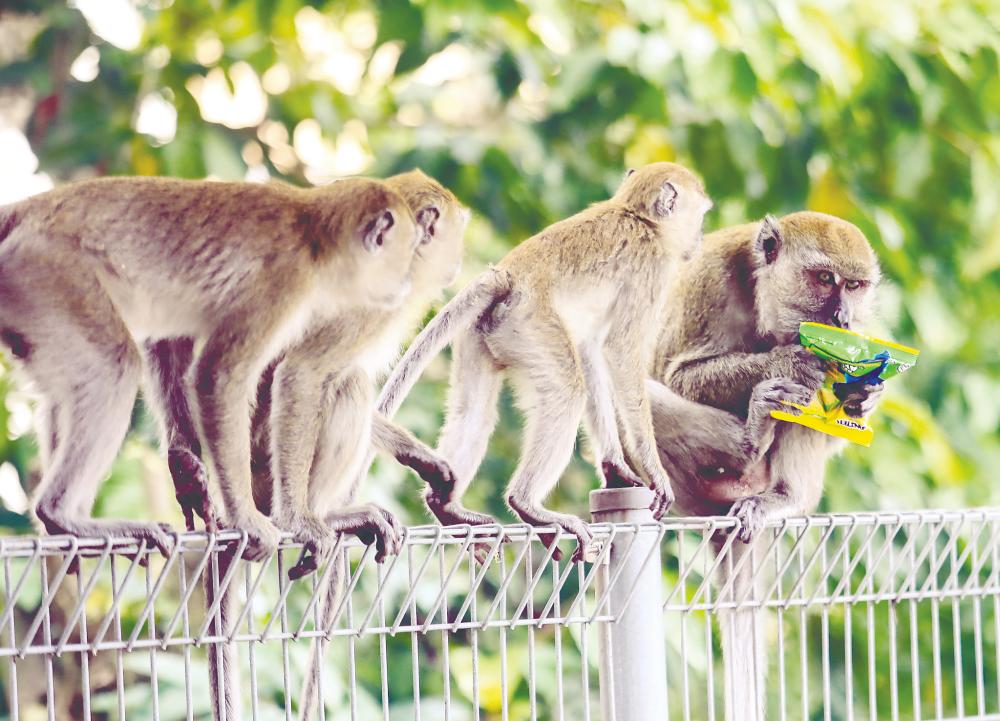PETALING JAYA: A more humane approach than poisoning is needed to manage the growing macaque population in urban areas, said Universiti Malaysia Terengganu Faculty of Science and Marine Environment Assoc Prof Dr Chong Ju Lian.
Commenting on a widely spread video in which a man is seen throwing poisoned ice cream at a troop of macaques after calling them pests that invade homes, she said such action is inhumane, particularly when dealing with human-animal conflicts.
The roughly one-minute video has raised questions online about how to control wildlife that encroach on urban areas.
Chong, who is also Malaysian Nature Society honorary secretary, said poisoning macaques causes them harm and poses risks to non-targeted species.
Killing, poisoning or torturing wild animals is a criminal act under the Wildlife Conservation Act 2010, and violators could face a maximum fine of RM1 million and up to 15 years’ jail upon conviction.
“Leaving out poisoned bait could harm the ecosystem. There have been cases in which people accidentally consumed food laced with rat poison that was meant for wild animals. Poison should never be the solution. It is a painful way for animals to die and anyone resorting to using it to control wildlife numbers shows a lack of compassion.”
Universiti Putra Malaysia Wildlife Management senior lecturer Dr Tengku Rinalfi Putra Tengku Azizan said the growing urban macaque population is caused by various factors, with habitat loss being a significant contributor.
“Over the past 70 years, human encroachment has steadily reduced macaque habitats, forcing them to adapt to urban environments. The rise in the macaque population is a result of human activity and their adaptability to urban settings.”
He said human behaviour, such as poor food waste disposal and an abundance of leftovers in public spaces, have attracted macaques and worsened the issue.
“As opportunistic feeders, macaques have adapted by relying on human food sources, allowing them to not only survive but thrive despite the challenges. This contributes to escalating conflicts between them and humans.”
Chong said a multidisciplinary approach to wildlife control is essential, with stakeholders working together to address the problem.
“Authorities and NGOs could raise awareness to reduce human-wildlife conflicts and promote peaceful coexistence. This includes not feeding macaques and improving waste management with secure bins.”
She urged the public not to take matters into their own hands when faced with human-wildlife conflicts but to
contact the authorities.
“The public should report any cruelty towards animals to the Wildlife and National Parks Department, which manages
human-wildlife issues through trapping, translocation and contraception.”
Malaysian Animal Welfare Association (Mawa) president Mukunnan Sugumaran expressed shock and concern over the poisoning of macaques.
“It was hard to watch the video. When the man threw the food at them, the macaques were excited but unaware that the food would eventually kill them. It is heartbreaking,” he said, adding that the culprit, who is an online vendor, used the video to promote a pesticide product.
He said the biggest concern is that the incident could encourage others to misuse poisons to target macaques, other wildlife or even a neighbour’s pet that one may not like.
Mawa has lodged a police report against the online vendor and an investigation is underway.
theSun reached out to the department for comment but did not received a response.









